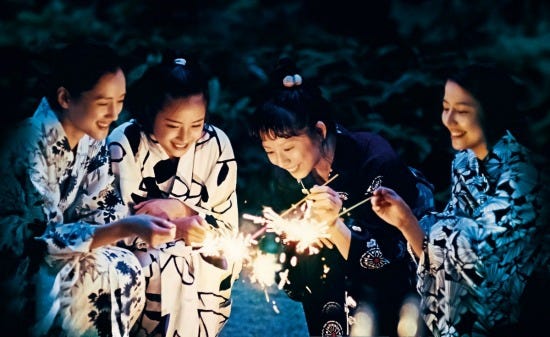Our Little Sister

Maybe I’m getting older and wiser after all. (The first is a demonstrable certainty; the latter is highly debatable.) I’m finding myself enjoying types of movies that I used to eschew. Perhaps my tastes are growing broader, or the films are just getting better.
I prefer movies that have a strong narrative arc. “Tell me a story,” is the silent plea I always make as I settle into my theater seat. So movies that are more about character and dialogue, a sense of place and mood, tend to lose my attention if there’s not a good yarn to go with it.
There’s not much of a story to “Our Little Sister,” a beautiful Japanese movie about a foursome of young sisters living together in an old ramshackle house in a seaside village. Three are professionals in their 20s, enjoying their singlehood and sisterly bond. Then their 14-year-old half-sister comes to live with them, and the rest of the movie is about how this addition shifts the dynamic of relationships in the household.
That’s it; that’s all there is to it.
Raised on American movies, I kept expecting the little sister to reveal some terrible dark secret, or turn out to be a burgeoning serial killer, or something.
Nope.
Suzu (Suzu Hirose) is just a tender, open-hearted young girl, glad to be out of her trying old circumstances but still wary about fitting in with the new. Her father has just died after a long illness, during which the burden of caring for him fell to her. Her stepmother had little relationship with her, so she gladly accepts her older sisters’ spontaneous invitation after the funeral to come live with them.
There is some potential for conflict. Suzu’s mother, who died herself long ago, was her father’s mistress during the time he was married to the older sisters’ mother. At the time the affair was revealed, their mother abandoned them in emotional distress, and they have not seen or spoken to her since. So their little sister is the outcome of their own family’s fracturing.
Suzu is terrified at the prospect of being resented, but the sisters offer her nothing but warmth. Yoshino (Masami Nagasawa) is the wild child of the bunch, who loves to drink and trade in boyfriends for new ones, in between her day job at a bank. She often fights with her oldest sister, Sachi (Haruka Ayase), a nurse who has assumed the role of household matriarch, kindly but often more stern than she needs to be. Chika (Kaho) is the oddball with eclectic tastes in men, food and other things, but is probably the most centered.
Later the elder girls’ mother (Midoriko Kimura ) shows up, and needless to say she’s not thrilled about seeing the offspring of the woman who betrayed her living in her former home. She proposes selling the old house, but the girls grew up there and have no intention of leaving.
Again, I presumed this storyline would head into a nasty legal battle or something equally dramatic. But the tension finds another, more pleasing resolution.
Much of the movie is simply the four young women, coexisting in the house — sharing meals, occasionally bickering, teasing each other about their boyfriends or lack thereof, making the family’s traditional plum wine from the old tree in the garden. There’s an idyllic, contemplative nature to these scenes, supplemented by the gorgeous cinematography. I never felt like there was a need for “something to happen.”
These four characters are the something, as we watch them grow and change simply by the nature of coming closer. Writer-director Hirokazu Koreeda, who adapted the manga comic by Akimi Yoshida, has left me not just entertained, but enlightened.



